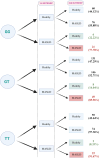The Protective Effect of FOXO3 rs2802292 G-Allele on Food Intake in a Southern Italian Cohort Affected by MASLD
- PMID: 40284181
- PMCID: PMC12030307
- DOI: 10.3390/nu17081315
The Protective Effect of FOXO3 rs2802292 G-Allele on Food Intake in a Southern Italian Cohort Affected by MASLD
Abstract
Background: Metabolic Dysfunction-Associated Steatotic Liver Disease (MASLD) is a cluster of conditions characterized by accumulations of fat, metabolic factors such as obesity, diabetes and high cholesterol. MASLD is now the leading cause of chronic liver disease worldwide, with a rapidly increasing trend. We aimed to demonstrate that genetic variants of rs2802292 SNP can influence the development of MASLD even after many years. Methods: We studied 650 participants from the NUTRIHEP cohort, both at baseline (2005-2006) and at first recall (2014-2018), and genotyped rs2802292. The validated European Prospective Investigation into Cancer and Nutrition (EPIC) questionnaire was administered during the visit, and each single food was assigned to one of 33 groups. Results: Associations of food intake at baseline with MASLD were found in the first recall, for each genotype, GG, GT, and TT, and several covariates were used to adjust models. Dressing fats other than olive oil resulted protection against MASLD in GG subjects, whereas seed oil, juices, and spirits resulted in protection against MASLD for GT subjects. An increased risk of MASLD was found for subjects with the TT genotype for white meat intake (OR = 1.018, p = 0.031, 1.002 to 1.035 95% C.I.), ready-to-eat dishes (OR = 1.015, p = 0.033, 1.001 to 1.029 95% C.I.), processed meat (OR = 1.093, p = 0.003, 1.031 to 1.158 95% C.I.), and processed fish (OR = 1.085, p = 0.037, 1.005 to 1.172 95% C.I.). Conclusions: Subjects with the TT genotype had a higher risk of developing MASLD than subjects with other genotypes. A healthier lifestyle is important to counteract liver disease.
Keywords: MASLD; food intake; single nucleotide polymorphism.
Conflict of interest statement
The authors declare no conflicts of interest.
Figures
Similar articles
-
Exploring the Relationship of rs2802292 with Diabetes and NAFLD in a Southern Italian Cohort-Nutrihep Study.Int J Mol Sci. 2024 Sep 1;25(17):9512. doi: 10.3390/ijms25179512. Int J Mol Sci. 2024. PMID: 39273459 Free PMC article.
-
A Dose-Response Study on the Relationship between White Meat Intake and Metabolic Dysfunction-Associated Steatotic Liver Disease (MASLD) in Southern Italy: Results from the Nutrihep Study.Nutrients. 2024 Sep 13;16(18):3094. doi: 10.3390/nu16183094. Nutrients. 2024. PMID: 39339694 Free PMC article.
-
Dietary fiber intake, genetic predisposition of gut microbiota, and the risk of metabolic dysfunction-associated steatotic liver disease.Food Res Int. 2025 Jun;211:116497. doi: 10.1016/j.foodres.2025.116497. Epub 2025 Apr 17. Food Res Int. 2025. PMID: 40356189
-
Interplay of Mediterranean-diet adherence, genetic factors, and metabolic dysfunction-associated steatotic liver disease risk in Korea.J Transl Med. 2024 Jun 25;22(1):591. doi: 10.1186/s12967-024-05408-z. J Transl Med. 2024. PMID: 38918799 Free PMC article.
-
Impact of PNPLA3 and TM6SF2 polymorphisms on the prognosis of patients with MASLD and type 2 diabetes mellitus.Liver Int. 2024 Apr;44(4):1042-1050. doi: 10.1111/liv.15845. Epub 2024 Jan 31. Liver Int. 2024. PMID: 38293718
Cited by
-
Optimal Vegetable Intake for Metabolic-Dysfunction-Associated Steatotic Liver Disease (MASLD) Prevention: Insights from a South Italian Cohort.Nutrients. 2025 Jul 29;17(15):2477. doi: 10.3390/nu17152477. Nutrients. 2025. PMID: 40806062 Free PMC article.
References
MeSH terms
Grants and funding
LinkOut - more resources
Full Text Sources
Research Materials
Miscellaneous


